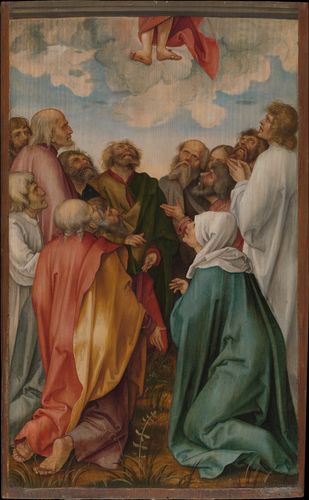
Beloved Members of St. Martin’s,
Although, as we can’t be reminded enough, Easter is a season that lasts 50 days, there is a notable event at day 40—the Ascension of the Lord. It is traditionally observed on a Thursday, even though the formal celebration of this event is usually transferred to the following Sunday, as we are doing. The Ascension is such a pivotal event in leading to the birth of the Church that we get two accounts of it: one at the end of Luke’s gospel, and one at the start of the book of the Acts of the Apostles.
Ten days after that actual Feast of the Ascension, next Sunday, we will celebrate Pentecost, which has two overlapping events associated with it as we see in the very first verses in the Acts of the Apostles: first, it is the Jewish Festival of Weeks, or Shavuot, a harvest festival, and the descent of the Holy Spirit upon the disciples as foretold in our reading today. After 40 days of explaining to the disciples, of them hearing Jesus constantly reminding them that he is leaving them but comforting them with the promise of the Holy Spirit, the disciples still have questions—kind of like an audience that keeps calling for encores to keep the concert going just a little longer. Jesus has spent an additional 40 days after his resurrection explaining to the disciples what is essential. And once again, the disciples miss, spectacularly, understanding what that means. Just like we do all these years later. The thing they ask him-- again-- is whether he is going to finally re-establish the independent monarchy to this tiny country groaning under the burden of yet another occupying army. They try to turn Jesus into a partisan hack. Even after all this time, they cannot resist trying to get Jesus to be the warrior king they had been waiting for, asking him to restore the monarchy to Israel. The oppression that Israel has endured throughout most of its history—save for the brief moment of the reigns of David and his son Solomon, frankly—is something they always believed would be ended with the coming of the Messiah.
Yet forgotten within the request for a king is the particularity of the request. When Israel first asked God for a king, their prophets warned them that the only king and allegiance they needed was God, and that in choosing a human king, they were choosing to be oppressed by a strong man rather than be led by God into true freedom and equality. Yet they insisted—and it didn’t turn out too well. If you read between the lines, you see that even by Solomon’s reign, for all his supposed glory and wisdom, the people were being deprived of the right to their own labor as the king sought ever grander wars and palaces to showcase his own vanity. The other problem with making Jesus a national king is that the disciples who ask for that are passively waiting for Jesus to solve their problems, rather than understand that Jesus is calling them to their responsibilities as disciples. Once again, Jesus has to remind them that there is something more important that they will be empowered to do: to be “baptized with the Holy Spirit” and then BUILD the kingdom of God by “being my witnesses… to the ends of the earth”. Disciples of Jesus are not to wait for God to transform the world. They (and WE) are literally God’s hands to transform the world. The disciples are given the power. The disciples will have the ability to utilize that power and will need to be willing to take risks to fulfill that commission.
And we are the disciples today, as member of Christ’s body in the world- the Church. As the Church, Christ is with us and we are in Christ, as we have been hearing repeatedly in our lectionary readings. Jesus’s own life among us was meant to show us how to live a God-centered life—and most of the time, that didn’t simply mean spending time in worship—in fact, during his life Jesus dissuaded his followers from worshiping him. Instead, he called his disciples to FOLLOW him—to emulate Jesus in every way we can and in every moment we can. Christ has repeatedly cajoled us not to stand around all day gawking, looking for Jesus to perform magic tricks or to solve all our problems (yes, this is redundant), but to get on with the business of making Christ visible in the world, for the sake of ourselves and everyone else.
This is our essential nature as the Church. It is our charge and reason for existence. Not just being spectators, not just passively worshipping for our own sakes, but to be who were we created to be: Jesus’s followers, acting out of love for the sake of the world.
In Christ,
Mother Leslie+